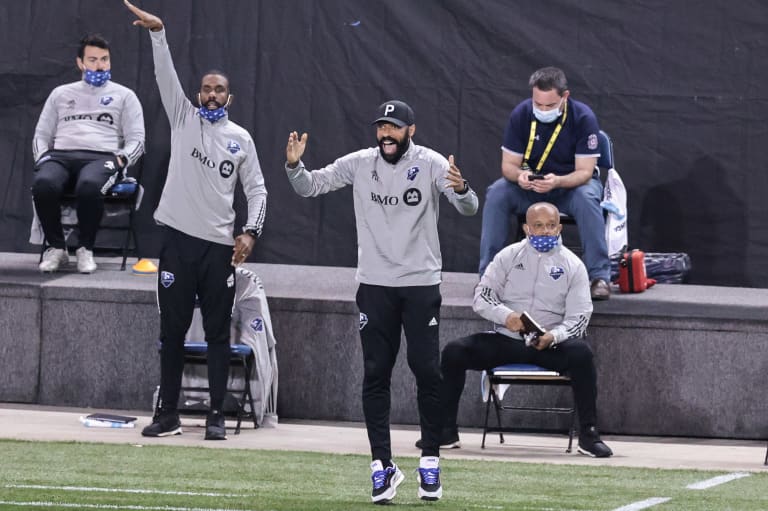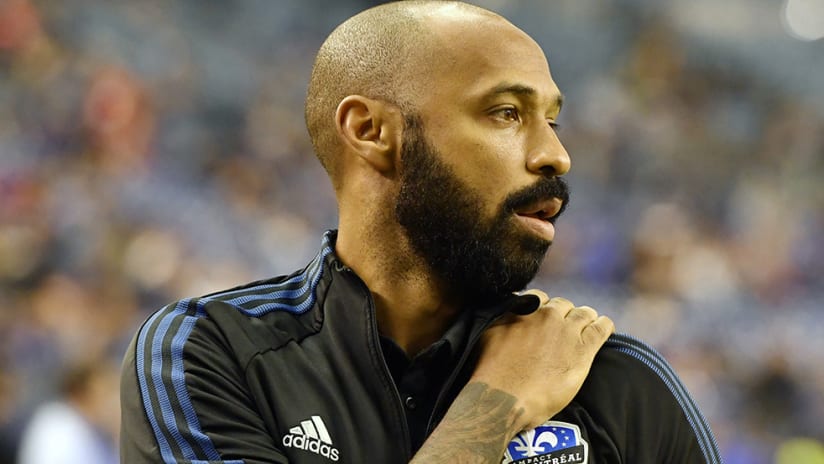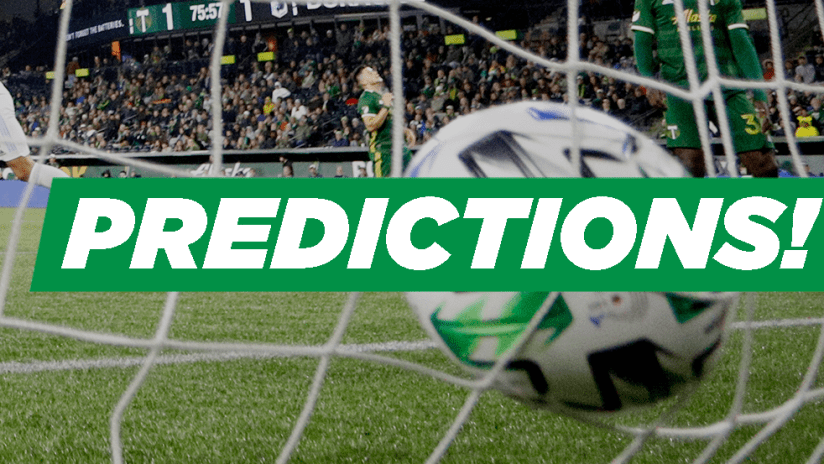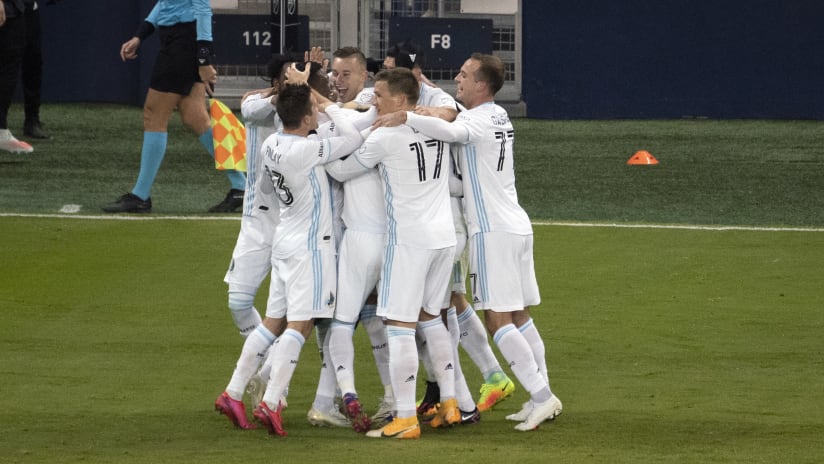It’s important that I lay all my cards on the table right off the bat and make my loyalties known: I absolutely love Thierry Henry and want to see him succeed as a manager.
I was in the Arsenal youth academy for five years and my time there overlapped with his time in the first team when he was the best striker in Europe and was scoring goals for fun in the English Premier League.
My admiration for him grew even more over a four-hour dinner in Seattle in 2012 — Dwayne DeRosario was also present — where I picked his brain, heard some legendary stories and exchanged contact info. They say you should never meet your idols because they may disappoint you, but my respect for Thierry only grew the more I spoke to him. While I’ll certainly be objective in my assessment of his first season as Montreal Impact manager, I can’t sit here and hide the fact that for many kids in London, he was our Michael Jordan.
Great players — I’m talking about the very elite, top 20 of all-time or ones who were once the best in their position — rarely make great coaches. I can honestly think of only a few who were top-five players in their time that then became great coaches. Those would include: Alfredo Di Stefano, Johann Cruyff, Franz Beckenbauer and Zinedine Zidane.
Maradona and Zico have been average at best, Platini underachieved as a coach and Lothar Matthaus has had mixed results. Romario lasted one season as a manager and most of the greats — Pele, Ronaldo, Ronaldinho and Roberto Baggio among them – avoid coaching altogether.

It can be hard for great players in any sport to become great coaches because their expectations usually align with what came naturally to them and they fail to understand that 99 percent of players simply cannot do the things that they could. This is why I felt Thierry Henry would struggle as a coach, not because he doesn’t have good ideas or the passion for it, but because he was so good and had such high demands for himself that he could easily get frustrated when his players can't implement what he’s asking them. I couldn’t have been more wrong. He’s by no means a candidate for Coach of the Year, but he’s actually done a very good job in Montreal in a very challenging year.
First, I think he understood very quickly that he had to adapt his expectations and demands to the players he has rather than what he’s used to. I’m sure he still gets frustrated with misplaced passes or simple technical errors, but being a former MLS player has helped him because he knows the league's strengths and limitations.
Second, he’s done a great job of being flexible with his ideas. I know for a fact that he wants to dominate possession and recreate the football he learned from Arsene Wenger and Pep Guardiola because he’s on record saying as much. But he realized very early on that it would be unrealistic to try and play that way with the players he has, and in his very first season. That’s why I’ve been impressed with his willingness to change tactics and formations from game to game in order to find what best suits his players.
Take their last three games of the regular season, where they played a 4-1-2-1-2, a 3-5-2 and a 4-3-3. Some might say that’s too much tinkering and experimentation, but I view it as a coach who's willing to try things and adapt based on the opponent and the personnel available to him. Thierry has been very good about trying things — I think at times he’s crossed the line, such as when he played Samuel Piette as a right winger in a game against Toronto, a position that doesn’t suit the midfielder's strengths – but overall I think those decisions are best viewed as a coach who's quickly learning how to compromise some of his desires with what’s most likely to work.
Third, Henry is unique among MLS coaches since he's the only one who was once a top 3-5 player in the world. He's played and starred on teams with Dennis Bergkamp, Zidane, Messi, Ronaldinho, Xavi, Iniesta, Patrick Vieira, Robert Pires and many more. He's won the World Cup, European Championship, the Premier League, La Liga and a Champions League. He retired as both Arsenal’s and the French national team’s all-time leading scorer. He once scored 30 goals and had 20 assists in the same season and he has a statue — yes, a statue — outside Arsenal’s Emirates Stadium. Simply put, no other coach can match even 10 percent of that resume and that’s why I think Thierry has a power that no one else has.
Whether he’s right or wrong, it would take some balls to question him. Earlier in the year, he mostly kept Bojan Krkic on the bench. Krkic is a talented player with an impressive resume — he's a former FC Barcelona teammate of Henry’s — and someone who Montreal signed to be a key player. For whatever reason, Henry felt the team was better without Bojan early on and he had no problem keeping him on the bench.
There are coaches who’ve done similar things, but the difference is that Henry’s stature in the game allows him to make big decisions without being questioned as often as someone else might be. Would Bojan have quietly accepted that decision if it came from anyone but Henry? As a player, even if you don’t agree with him, you’re more likely to accept his decision because you know that he knows more about the game than anyone else in the room. This isn’t to say that he shouldn’t be questioned or challenged, but I'm saying that he has an inherent authority to shape his team how he wants — even if that means benching big names and changing formations every week — with less resistance than a coach without his resume would face.
It’s the same power Zinedine Zidane has at Real Madrid. Of course Gareth Bale should have played more, but how was he going to win that fight against Zidane? He didn’t have to like Zidane’s decision, but he had to accept it because Zidane’s resume is as good as anyone’s that’s ever played the game. Klopp and Guardiola have earned total control over their locker rooms by winning at a ridiculous rate, whereas Henry, like Zidane, is given that authority not just after winning a ton of games and trophies. That respect can be lost, but very few have it automatically to begin with.

I think Henry's man-management can still improve because I’ve seen some of the glares he gives players who haven’t played well or have made too many mistakes. For a player, that approach from your coach can affect your confidence, even more so when that coach is an all-time great. A hug, a high five, a “well done” or “unlucky, you’ll get it right next time” from Thierry Henry can carry enough weight to spark confidence, especially in young players who are still finding their way.
Lastly, I think Henry will ultimately prove to be a big success in Montreal if he stays there for at least three years. After the bad experience at AS Monaco, he could have gone back to his TV gig in England, made excuses for why it went wrong or lived off what he did as a player and cash in on appearances and sponsorships. But he reached out to Montreal and wanted the opportunity.
With all due respect, Montreal is not one of the more glamorous jobs in MLS, so that’s why I think Henry is there for the right reasons. He wants to prove himself as a young coach and not rely on what he did as a player. He will need a lot of help and investment from the front office if he is to become the success I think he can be. He will need a true goalscorer. He’s played Romell Quioto as a No. 9 and the Honduran has been good, but they still need a guy who will get you 15 goals in his sleep. They also need a playmaker and a couple of defensive pieces as well.
Most importantly, what he needs is time. Time to implement his ideas on the training pitch (preferably in a season that isn’t disrupted by a global pandemic), time to discover who he wants to be as a coach and time to learn from his mistakes. It took him almost 20 games before he scored his first Arsenal goal, but once he got that first one, 227 more followed. I believe he needed this season to restore his confidence as a coach and to remind us all that he's not a quitter, but rather someone that's up for a big challenge. Making the playoffs is a good first step, but what he needs to do next is win consecutive games consistently, settle on a style and identity, and bring some silverware to Montreal.
I have no doubt that if he's given time and support, Thierry Henry can join that small group of great players who made the leap to becoming great managers.








